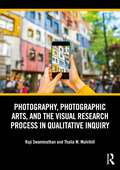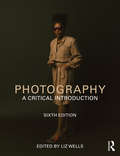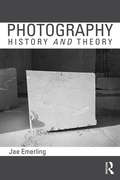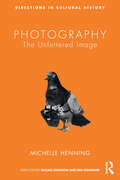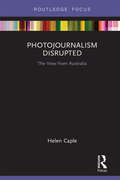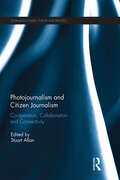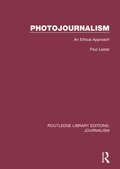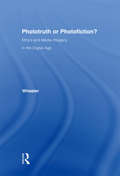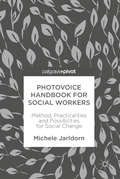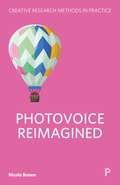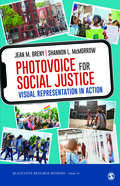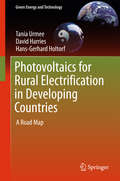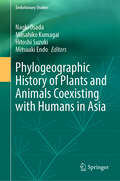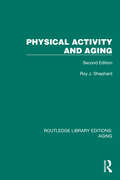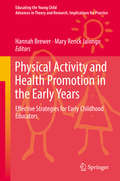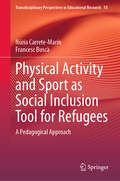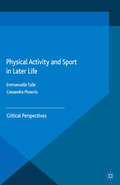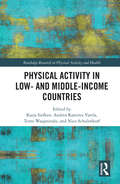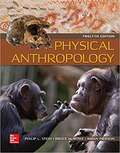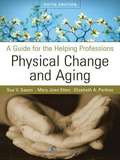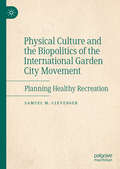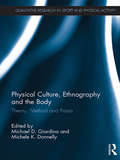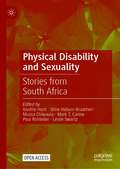- Table View
- List View
Photography, Photographic Arts, and the Visual Research Process in Qualitative Inquiry
by Raji Swaminathan Thalia M. MulvihillPhotography, Photographic Arts and the Visual Research Process in Qualitative Inquiry is a book that introduces doctoral students and early career researchers to photography as a significant dimension of visual qualitative methods.It examines the potential of photographic arts in qualitative research by highlighting theory and practice. Theories of photographic research and the types of photography within the genre are presented along with tips and exercises on how to conduct visual research through the use of photography. The central features of this book include learning to incorporate photography and photographic thinking through the arc of the research process. Question posing, data gathering, data analysis, and presentation and dissemination of photographic research ae discussed. Ethics for photographic qualitative research is discussed. Learning to consider all senses for visual analysis and to consider issues of power and equity in photographic research is explained. Readers of this book can practice different ways to think about photographic research through the exercises and tips offered at the end of each chapter.Graduate students and early career researchers who are interested in qualitative research will find this book valuable to learn and experiment with photography and photographic arts in visual qualitative research.
Photography: A Critical Introduction
by Liz WellsNow in its sixth edition, this seminal textbook examines key debates in photographic theory and places them in their social and political contexts. Written especially for students in further and higher education and for introductory college courses, it provides a coherent introduction to the nature of photographic seeing. Individual chapters cover: • Key debates in photographic theory and history • Documentary photography and photojournalism • Personal and popular photography • Photography and the human body • Photography and commodity culture • Photography as art. This revised and updated edition includes new case studies on topics such as: Black Lives Matter and the racialised body; the #MeToo movement; materialism and embodiment; nation branding; and an extended critical discussion of landscape as genre. Illustrated with over 100 colour and black and white photographs, it features work from Bill Brandt, Susan Derges, Rineke Dijkstra, Fran Herbello, Hannah Höch, Mari Katayama, Sant Khalsa, Karen Knorr, Dorothea Lange, Susan Meiselas, Lee Miller, Ingrid Pollard, Jacob Riis, Alexander Rodchenko, Andres Serrano, Cindy Sherman and Jeff Wall. A fully updated resource information, including guides to public archives and useful websites, full glossary of terms and a comprehensive bibliography, plus additional resources at routledgetextbooks.com/textbooks/9780367222758/ make this an ideal introduction to the field.
Photography: History And Theory
by Jae EmerlingPhotography: History and Theory introduces students to both the history of photography and critical theory. From its inception in the nineteenth century, photography has instigated a series of theoretical debates. In this new text, Jae Emerling therefore argues that the most insightful way to approach the histories of photography is to address simultaneously the key events of photographic history alongside the theoretical discourse that accompanied them. While the nineteenth century is discussed, the central focus of the text is on modern and contemporary photographic theory. Particular attention is paid to key thinkers, such as Baudelaire, Barthes and Sontag. In addition, the centrality of photography to contemporary art practice is addressed through the theoretical work of Allan Sekula, John Tagg, Rosalind Krauss, and Vilém Flusser. The text also includes readings of many canonical photographers and exhibitions including: Atget, Brassai, August Sander, Walker Evans, The Family of Man, Diane Arbus, Lee Friedlander, Cindy Sherman, Bernd and Hilla Becher, Sebastaio Salgado, Jeff Wall, and others. In addition, Emerling provides close readings of key passages from some major theoretical texts. These glosses come between the chapters and serve as a conceptual line that connects them. Glosses include: Roland Barthes, "The Rhetoric of the Image" (1964) Susan Sontag, Regarding the Pain of Others (2002) Michel Foucault on the archive (1969) Walter Benjamin, "Little History of Photography" (1931) Vilém Flusser, Towards a Philosophy of Photography (1983) A substantial glossary of critical terms and names, as well as an extensive bibliography, make this the ideal book for courses on the history and theory of photography.
Photography: The Unfettered Image (Directions in Cultural History)
by Michelle HenningWe live in a time in which photographs have become extraordinarily mobile. They can be exchanged and circulated at the swipe of a finger across a screen. The digital photographic image appears and disappears with a mere gesture of the hand. Yet, this book argues that this mobility of the image was merely accelerated by digital media and telecommunications. Photographs, from the moment of their invention, set images loose by making them portable, reproducible, projectable, reduced in size and multiplied. The fact that we do not associate analogue photography with such mobility has much to do with the limitations of existing histories and theories of photography, which have tended to view photographic mobility as either an incidental characteristic or a fault. Photography : The Unfettered Image traces the emergence of these ways of understanding photography, but also presents a differently nuanced and materialist history in which photography is understood as part of a larger development of media technologies. It is situated in much broader cultural contexts: caught up in the European colonial ambition to "grasp the world" and in the development of a new, artificial "second nature" dependent on the large-scale processing of animal and mineral materials. Focussing primarily on Victorian and 1920s–30s practices and theories, it demonstrates how photography was never simply a technology for fixing a fleeting reality.
Photography: Theoretical Snapshots
by J. J. Long Edward Welch Andrea NobleOver the past twenty-five years, photography has moved to centre-stage in the study of visual culture and has established itself in numerous disciplines. This trend has brought with it a diversification in approaches to the study of the photographic image. Photography: Theoretical Snapshots offers exciting perspectives on photography theory today from some of the world’s leading critics and theorists. It introduces new means of looking at photographs, with topics including: a community-based understanding of Spencer Tunick’s controversial installations the tactile and auditory dimensions of photographic viewing snapshot photography the use of photography in human rights discourse. Photography: Theoretical Snapshots also addresses the question of photography history, revisiting the work of some of the most influential theorists such as Roland Barthes, Walter Benjamin, and the October group, re-evaluating the neglected genre of the carte-de-visite photograph, and addressing photography’s wider role within the ideologies of modernity. The collection opens with an introduction by the editors, analyzing the trajectory of photography studies and theory over the past three decades and the ways in which the discipline has been constituted. Ranging from the most personal to the most dehumanized uses of photography, from the nineteenth century to the present day, from Latin America to Northern Europe, Photography: Theoretical Snapshots will be of value to all those interested in photography, visual culture, and cultural history.
Photojournalism Disrupted: The View from Australia (Disruptions)
by Helen CaplePhotojournalism Disrupted addresses the unprecedented disruptions in photojournalism over the last decade, with a particular focus on the Australian news media context. Using a mixed methods approach, the book assesses the situation facing press photographers and their employers in the supply of professional imagery for news storytelling. Detailed qualitative case studies looking at special events and crisis reporting complement a longitudinal study of sourcing practices around everyday events. Additionally, interviews with industry professionals offer insights into how news organizations are managing significant structural change. Ultimately, the book argues that photojournalism is being reshaped in line with wider industrial disruptions that have led to the emergence of a highly casualized workforce. As a comprehensive study of contemporary photojournalism practices, Photojournalism Disrupted is ideal for scholars and students internationally, as well as (photo)journalists and media professionals.
Photojournalism and Citizen Journalism: Co-operation, Collaboration and Connectivity (ISSN)
by Stuart AllanIf everyone with a smartphone can be a citizen photojournalist, who needs professional photojournalism? This rather flippant question cuts to the heart of a set of pressing issues, where an array of impassioned voices may be heard in vigorous debate. While some of these voices are confidently predicting photojournalism's impending demise as the latest casualty of internet-driven convergence, others are heralding its dramatic rebirth, pointing to the democratisation of what was once the exclusive domain of the professional.Regardless of where one is situated in relation to these stark polarities, however, it is readily apparent that photojournalism is being decisively transformed across shifting, uneven conditions for civic participation in ways that raise important questions for journalism’s forms and practices in a digital era. This book's contributors identify and critique a range of factors currently recasting photojournalism's professional ethos, devoting particular attention to the challenges posed by the rise of citizen journalism. This book was originally published as two special issues, in Digital Journalism and Journalism Practice.
Photojournalism: An Ethical Approach (Routledge Library Editions: Journalism)
by Paul Martin LesterOriginally published in 1991. "A photojournalist is a mixture of a cool, detached professional and a sensitive, involved citizen. The taking of pictures is much more than F-stops and shutter speeds. The printing of pictures is much more than chemical temperatures and contrast grades. The publishing of pictures is much more than cropping and size decisions. A photojournalist must always be aware that the technical aspects of the photographic process are not the primary concerns." <P><P>This book addresses ethics in photojournalism in depth, with sections on the philosophy in the discipline, on pictures of victims or disaster scenes, on privacy rights and on altering images. As important and interesting today as when it was first in print.
Phototruth Or Photofiction?: Ethics and Media Imagery in the Digital Age
by Thomas H. WheelerThis text examines the use of images in journalistic contexts and the manipulation of these images to accomplish varying objectives. It provides a framework for critical discussion among professionals, educators, students, and concerned consumers of newspapers, magazines, online journals, and other nonfiction media. It also offers a method of assessing the ethics of mass-media photos, which will help visual journalists to embrace new technologies while preserving their credibility. Phototruth or Photofiction? also: *recounts the invention of photography and how it came to be accorded an extraordinary degree of trust; *details how photos were staged, painted, composited and otherwise faked, long before digital technology; *lists contemporary image-altering products and practices; *details many examples of manipulated images in nonfiction media and lists rationales offered in defense of them; *explains how current ethical principles have been derived; *lays groundwork for an ethical protocol by explaining conventions of taking, processing, and publishing journalistic photos; and *offers tests for assessing the appropriateness of altered images in non-fiction media. Each chapter is followed by "Explorations" designed to facilitate classroom discussion and to integrate into those interactions the students' own perceptions and experiences. The book is intended for students and others interested in the manipulation of images.
Photovoice Handbook for Social Workers: Method, Practicalities and Possibilities for Social Change
by Michele JarldornThis book provides inspiration for social workers to explore the possibilities of using Photovoice to engage with communities. Built on strong theoretical foundations and grounded in ethical principles, Jarldorn assesses Photovoice as an arts-based approach that provides a valuable mechanism for social workers to engage people in participatory action research, with the potential to influence policy and public opinion. Positioning Photovoice as a method aligned with feminist and radical social work perspectives, the author draws upon her research project which used Photovoice with former prisoners to demonstrate the transformative potential of participatory methods. Photovoice Handbook for Social Workers is intended to be a useful, hands-on resource, combining the importance of theory and the practicalities of doing action research.
Photovoice Reimagined (Creative Research Methods in Practice)
by Nicole BrownOver the past decades, ‘photovoice’ has emerged as a participatory and creative research method in which participants capture and discuss their reality through photographs. This indispensable ‘how-to’ book with exercises and visual aids takes novice and veteran researchers through the practicalities and ethics of applying this approach. Written by experienced teacher Nicole Brown, the book: - outlines the conceptual foundations and historical development of the approach; - redefines photovoice as a research method and as a framework; - explores how photovoice can be used in all stages of research from data collection to dissemination; - provides guidance and food for thought to get researchers started on their project. Each chapter ends with exercises that focus readers' learning and understanding by practically engaging them in the work presented throughout. The examples and visual aids will help them recognise all the details presented and represented in a photograph. For researchers who would like to try their hand at photovoice as a method or as a framework to foster a more participatory approach, this is the ultimate guide to kickstart their project.
Photovoice for Social Justice: Visual Representation in Action (Qualitative Research Methods)
by Jean M. Breny Shannon L. McMorrowPhotovoice for Social Justice, the latest volume in SAGE′s Qualitative Research Methods Series, helps readers in the health and social sciences learn the foundations and applications of this exciting qualitative method. Authors Jean M. Breny and Shannon L. McMorrow approach photovoice as not only a community-based participatory research method, but as a method for social justice, centering community participants, organizations, and policy makers at the heart of this research method. Special topics relating to social justice include a focus on ethics and working with marginalized communities, sensitive concerns during data collection, and presenting the work to communities and policymakers, as well as academics. Written for students and researchers new to photovoice, this brief text takes readers from the process of conceptualizing and implementing a photovoice study to analyzing data and finally presenting the results of the study. The book concludes with suggestions for future iterations of photovoice, including web based resources and digital storytelling. The authors take into account the realities of photovoice as a method by providing practical, applied tools including sample consent forms, presentations, recruitment flyers, and photo-taking tips. Using Photovoice for Social Justice, new and experienced researchers can design, implement, and analyze their photovoice projects.
Photovoice for Social Justice: Visual Representation in Action (Qualitative Research Methods)
by Jean M. Breny Shannon L. McMorrowPhotovoice for Social Justice, the latest volume in SAGE′s Qualitative Research Methods Series, helps readers in the health and social sciences learn the foundations and applications of this exciting qualitative method. Authors Jean M. Breny and Shannon L. McMorrow approach photovoice as not only a community-based participatory research method, but as a method for social justice, centering community participants, organizations, and policy makers at the heart of this research method. Special topics relating to social justice include a focus on ethics and working with marginalized communities, sensitive concerns during data collection, and presenting the work to communities and policymakers, as well as academics. Written for students and researchers new to photovoice, this brief text takes readers from the process of conceptualizing and implementing a photovoice study to analyzing data and finally presenting the results of the study. The book concludes with suggestions for future iterations of photovoice, including web based resources and digital storytelling. The authors take into account the realities of photovoice as a method by providing practical, applied tools including sample consent forms, presentations, recruitment flyers, and photo-taking tips. Using Photovoice for Social Justice, new and experienced researchers can design, implement, and analyze their photovoice projects.
Photovoltaics for Rural Electrification in Developing Countries
by Tania Urmee David Harries Hans-Gerhard HoltorfThe evidence suggests that many solar programs are being designed and implemented in isolation and without reliance on published guidelines or the experience gained by others. The conclusion is obvious: the likelihood of a program being successful would be greatly improved if program implementers were made more aware of best practice guidelines and of the lessons and experience learned by others in implementing previous programs. Furthermore, the best practice guidelines not only need to be readily available but need to describe the stages, issues and the stakeholders' roles in designing and implementing a SHS program. This book showcases a detailed road map that has been developed for the implementation of rural electrification projects in developing countries using solar PV. Features of this book will be case studies derived from personal participatory observation of the authors on Solar Home Systems, their impact, their advantages and disadvantages and their operation.
Phylogeographic History of Plants and Animals Coexisting with Humans in Asia (Evolutionary Studies)
by Hitoshi Suzuki Naoki Osada Masahiko Kumagai Mitsuaki EndoThis book offers a comprehensive understanding of the natural history of the Japanese Archipelago (Yaponesia), employing cutting-edge genomic research to provide insights into the prehistory in this region. It provides an in-depth exploration of the genetic makeup of domesticated plants and animals in the Japanese Archipelago, including their relationships with neighboring regions in Asia. The book is unique in its comprehensive approach, weaving together the latest genomic research, historical records, and linguistic analysis to provide a detailed understanding of the past. The book covers the development of Japanese society and culture from the Jomon era to the present day. It discusses the animal and plant diversity of the country, including their distribution, evolution, and interaction with human society and culture. The linguistic distributions of related terms are also explored. Using the latest genomic research, the book offers a fresh perspective on the past and present of the Japanese Archipelago, providing a comprehensive understanding of the natural and cultural history of the Japanese Archipelago. It is a valuable resource for professionals and academics in genomics, archaeology, and linguistics, as well as general readers interested in Japanese history, culture, and the environment.
Physical Activity and Aging: Second Edition (Routledge Library Editions: Aging)
by Roy ShephardIn the late 1980s, the relationship between physical activity or exercise and aging was one of great contemporary interest. On the one hand there was a growing elderly population in industrialized societies seeking an active rather than a passive retirement, while on the other hand there was much current interest in the benefits to health of physical activity.
Physical Activity and Health Promotion in the Early Years: Effective Strategies for Early Childhood Educators (Educating the Young Child #14)
by Mary Renck Jalongo Hannah BrewerThis book focuses on improving well-being among young children. It provides a theoretical base explaining why physical activity is important, and offers practical strategies for increasing health and well-being in early childhood settings. It takes ancient wisdom on the mind and body connection, applies it to the youngest children, and supports it with current empirical and international evidence—all with an eye toward improving wellness across the lifespan. The many topics discussed in the book include children’s motor skills, movement, interaction, physical literacy, the use of video games, dog ownership, developmental delays, as well as strategies to improve physical activities in the classroom and broader contexts. In recent years, children’s health has become a priority worldwide. Topics such as “screen time” “sedentary behavior” and “childhood obesity” have become important issues everywhere- in the news, in schools, in community and commercials settings, and among health care providers. Limiting sedentary behavior, increasing physical activity, and maintaining a nutritious diet are three fundamental needs during early childhood. Preschool years are a time when children begin to explore the world around them, and develop more vivid understandings of their surroundings. As this book shows, the early years may be the best time to teach wellness concepts and assist young children in establishing healthy lifestyle habits.
Physical Activity and Sport as Social Inclusion Tool for Refugees: A Pedagogical Approach (Transdisciplinary Perspectives in Educational Research #10)
by Núria Carrete-Marín Francesc BuscàThis book addresses the social benefits of physical activity and sport in promoting the social and educational inclusion of refugees living in Europe in line with Sustainable Development Goals 4, 10 and 16. It provides a theoretical framework supported by evidence obtained from a case study in the Spanish context. The book demonstrates how universities and formal and non-formal educational institutions, by means of service-learning activities managed by physical and social educators, enable refugees and students to practice physical activity, develop further learning and establish stable social networks. It shows how a pedagogical approach to physical activity can improve relationships between students and refugees and promote inclusion of all. It discusses the value of diversity in education and educational research, as well as transdisciplinarity in new educational and research approaches.
Physical Activity and Sport in Later Life: Critical Perspectives (Global Culture and Sport Series)
by Emmanuelle Tulle Cassandra PhoenixThis volume addresses key issues such as the cultural and discursive context in which physical activity is discussed; the process of becoming physically active; the role of care settings in enabling physical activity; pleasure; gender; and place and space.
Physical Activity in Low- and Middle-Income Countries (Routledge Research in Physical Activity and Health)
by Nico Schulenkorf Katja Siefken Andrea Ramirez Varela Temo WaqanivaluThis book critically evaluates the complex relations between physical activity, health imperatives and cultural and social opportunities in low- and middle-income countries (LMICs). The book explores the uncertainty of knowledge around physical activity behavior and its distinctive meanings in LMIC contexts, the factors influencing physical activity, and how populations across the world understand and live the concept of physical activity. It discusses the key challenges and opportunities for sustaining physical activity within geographically and culturally diverse contexts of LMICs; introduces the reader to contemporary global physical activity approaches, models and policies; and presents case studies from around the world, including Asia, Africa, South America, the Pacific and Europe. Overall, the text relates theory to practical examples to facilitate a better understanding of physical activity in context, emphasizes the need for targeted, context-specific and locally relevant interventions to create PA-enabling environments in LMICs, and highlights the role of a range of stakeholders, including policy makers and urban planners, sport and recreation services, mass media, educators and the civil society in shaping population physical activity levels. Taken together, this edited volume brings together the latest research on PA in LMICs from around the world, informs and directs future research and necessary policy change towards the sustainable integration of PA opportunities, and seeks to ultimately foster and promote population-based PA in LMIC settings. By presenting empirical data and policy recommendations, this text will appeal to scholars, researchers and practitioners with an interest in physical activity research, public health, health promotion, sociology of sport, and sports sciences in LMICs, as well as policy makers and experts working in health promotion, public health, sports and fitness, but also in the urban planning and infrastructure and governmental industries.
Physical Anthropology
by Philip L. Stein Bruce M. Rowe Brian PiersonPhysical Anthropology, has been thoroughly revised and updated to reflect the latest analyses, fossil finds, and discoveries in the field of physical anthropology. <p><p>This full-color text examines human evolution and biology through photos, illustrations, and an exploration of insights gleaned from anthropologists. Students of this text will appreciate the dynamic relationship between humans and their environment over time and develop the skills they need to dispel the myths and misconceptions surrounding evolutionary theory.
Physical Change and Aging: A Guide for the Helping Professions (5th edition)
by Sue V. Saxon Mary Jean Etten Elizabeth A. PerkinsAlthough this book focuses primarily on physical changes and the common pathologies associated with aging, it also considers the psychological and social implications of such changes for human behavior. Since aging is a complex process, it is impossible to consider biological or physical aspects without a comparable concern for the psychological, emotional, and social factors involved.
Physical Culture and the Biopolitics of the International Garden City Movement: Planning Healthy Recreation
by Samuel M. ClevengerThis book revisits the history of the international garden city town planning movement in the early twentieth century, focusing on the significance of various forms of 'physical culture' - sport, recreation, leisure, and other active body practices - within garden city planning discourse and the development of some of the first garden city communities in the United Kingdom and United States.
Physical Culture, Ethnography and the Body: Theory, Method and Praxis (Qualitative Research in Sport and Physical Activity)
by Michael D. Giardina Michele K. DonnellyThe corporeal turn toward critical, empirically grounded studies of the body is transforming the way we research physical culture, most evidently in the study of sport. This book brings together original insights on contemporary physical culture from key figures working in a variety of disciplines, offering a wealth of different theoretical and philosophical ways of engaging with the body while never losing site of the material form of the research act itself. Contributors spanning the disciplines of sociology, anthropology, communications, and sport studies highlight conceptual, methodological, and empirical approaches to the body that include observant-participation, feminist ethnography, autoethnography, physical cultural studies, and phenomenology. They provide vivid case studies of embodied research on topics including basketball, boxing, cycling, dance, fashion modelling and virtual gaming. This international collection not only reflects on the most important recent developments in embodied research practices, but also looks forward to the continuing importance of the body as a focus for research and the possibilities this presents for studies of the active, moving body in physical culture and beyond. Physical Culture, Ethnography and the Body: Theory, method and praxis is fascinating reading for all those interested in physical cultural studies, the sociology of sport and leisure, physical education or the body.
Physical Disability and Sexuality: Stories from South Africa
by Leslie Swartz Poul Rohleder Xanthe Hunt Stine Hellum Braathen Mussa Chiwaula Mark T. CarewThis open access edited volume explores physical disability and sexuality in South Africa, drawing on past studies, new research conducted by the editors, and first-person narratives from people with physical disabilities in the country. Sexuality has long been a site of oppression and discrimination for people with disabilities based on myths and misconceptions, and this book explores how these play out for people with physical disabilities in the South African setting. One myth with which the book is centrally concerned, is that people with disabilities are unable to have sex, or are seen as lacking sexuality by society at large. Societal understandings of masculinity, femininity, bodies and attractiveness, often lead people with physical disabilities to be seen as being undesirable romantic or sexual partners. The contributions in this volume explore how these prevailing social conditions impact on the access to sexual and reproductive healthcare, involvement in romantic relationships, childbearing, and sexual citizenship as a whole, of people with physical disabilities in the Western Cape of the country. The authors' research, and first person contributions by people with physical disabilities themselves, suggest that education and public health policy must change, if the sexual and reproductive health rights and full inclusion of people with disabilities are to be achieved.
